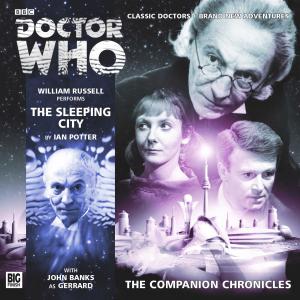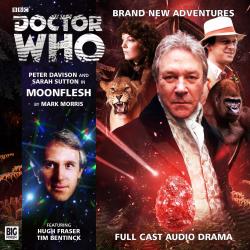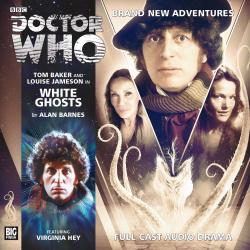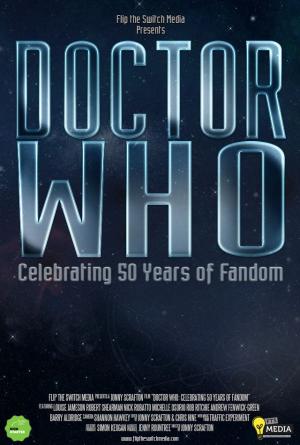
This well-prepared and well-paced documentary came as somewhat of a surprise to me when I got word of it the other day - perhaps having got the impression that the 50th Anniversary was covered exhaustively by the BBC alone. The 'hook' that separates it however is its focus on the many, many fans of the show. Some of the Who fans of course only came abroad when the wildly successful revival last decade hit full steam, but there were many who kept 'the flame alive' during the so-called 'wilderness years' of the 1990s and early 2000s.
The very beginning is a treat for anyone - grown-up or kid - who has been given a scare by the iconic Weeping Angels. A damp dark area somewhere urban which brings up memories of 'indistinguishable corridors' and these monsters are coming after the person with the running point of view. Although creepy there is a little 'tongue-in-cheek' side to it at the same time, which to my mind sums up
Doctor Who's
je ne sais quoi handily.
Although the title would imply there was a lot of fandom from the very beginning in 1963, this is perhaps misleading when it comes to which stories and production eras the documentary covers. Given the duration of this film it is in any case rather wise that the focus is on the 1970s onwards - that decade mostly in part to the prize interviewee that is
Louise Jameson who played Leela for nine stories. Indeed full-on conventions really took off once
John Nathan-Turner was producer and exercised his trump card ability in getting events to happen -with greater and greater scale and ceremony added to them.
Perhaps if the film had an extra ten or fifteen minutes and a budget to cover someone like
Peter Purves or
Anneke Wills then this would have really been a case of getting insight into the fifty years' span; although Purves does feature very briefly in convention footage. Jameson does at least describe the thrill of her and her family gathering to watch the show in its black and white days, which is something I did not know before.
I myself fall into that generation who got to experience classic doctor who in a wildly jumbled chronology as different stories had priority in terms of being released on cassette or repeated on BBC Two. One fan on the documentary describes his earliest memory being
Remembrance of the Daleks - quite understandably given its quality and *that* first cliff-hanger episode ending. I myself had rather less vivid memories of the story from start to finish, but that didn't last long once I secured a BBC video copy a few years later.
Some of the interview material provided by Jameson and
Robert Shearman is familiar if the viewer has bought the DVDs of relevant classic series stories. Nonetheless both are as engaging as ever. Jameson's outlining of how she got a bigger profile in the 70s and 80s - be it onscreen on TV or treading the boards of major theatres - is a good topic, reminding the viewer that some in the show did move into more mainstream projects such was their talent. Yet unlike some who shy away from conventions, Jameson was always comfortable with being recognised for her time as Leela and indeed noticed as a star of a major long running show.
Jameson also covers the fascinating area that was and is her up-and-down connection with
Tom Baker, fully emphasising just how much they are friends in present times. Her candour in saying questions at fan signings and panel interviews repeat themselves and her consequent need to try and get new material is very welcome; the sign of an out and out professional even when she is not acting. She also is rather concerned about some fans being perhaps taken for granted as a means to an economic end. Most important though is her summary of the Doctor being the do-gooder/outsider defending the vulnerable and different from bullies.
Shearman is still one of my very most admired authors and commentators of the show. How he continues to be passed over for a return to television
Doctor Who when others with clearly less imagination and wit return at least one more time is one of the great unsolved mysteries. But Shearman never for a moment gives you the impression that he is bitter. His recollection of attending meetings in the lead up to series one being produced and his low or vague expectations of any impact on the ratings are a welcome reminder of just how much of a risk the big-wigs at the BBC were apparently making when they let
Russell T Davies convince them of investing in an institution which many now saw as from a bygone age.
The author of
Dalek shares his feelings on being both a fan and a staff member, in a relaxed fashion. If only more people behind entertainment had that sense of being given the dream job of providing first rate escapism. He details the early days of writing for fanzines and expressing his views within the niche communities that were representative of pioneering fandom. There is also a fascinating glimpse into the heated debates that the writing team had when putting the show together; much like they did when they were still amateur fans in times past.
In terms of the actual 'normal' fans themselves, there is a lot to take away and reflect on, Lecturer
John Paul Green, who gets to include programs like
Doctor Who in his film and media syllabuses for undergrads, sums up well what I myself enjoy in
Doctor Who. There is a flexible formula and top notch realisation of our wildest dreams. A nice mention is made of
The Unfolding Text academic work of the early 1980s - which arguably had a big hand in the eventual glut of reference and in-depth texts which hit book shelves. He also reminds us of just how much
Star Wars made
Doctor Who look pedestrian, at least on the surface, for the rest of its run as an under budgeted family show. More positively Green backs up Shearman's words on the fandom creative output that was published professionally by Virgin, BBC books and produced as plays by Big Finish. His story on being an extra in
Rise of the Cybermen in series two is well-told. Whilst arguably most meaningful if the viewer knew Green personally, I still rate an invitation into a flagship drama as an extra being more valuable than being an oddity on a cynical reality TV show.
Lynne Hardy is a welcome contributor who points out that being able to hold a conversation is one of many skills all good fans have (and indeed had before 2005). I am happy to be writing this review knowing that this documentary is freely available to a market of fans bigger than ever before in 50+ years of space and time. Hardy describes fandom as a big 'family' which is rather a different perspective on things than Green's 'small community' description , and indeed a number of the other interviewees. This diversity of perspective is most welcome and makes the documentary end up avoiding a one-note 'love letter' feel.

Fandom in America - and how it changed and grew at different points - it would provide more than enough material for a whole separate documentary. What does feature of it here is quite enjoyable. We meet YouTube film maker
Michelle Osorio. There is a great story her in initiation by an ex- boyfriend into the show we all know and love. Also there are enticing details of her pet project of a series that features a Dalek in disguise in an office - complete with a brief clip from her film. Her story on how the Dalek prop was transported to where the film was being made is also uniquely heart warming for a travel enthusiast like myself.
The film also features a member of the crew who contributed to the series for about 5 years (and covering both
Tennant and
Smith).
Nick Robatto's laid back manner of describing his fine work on props - that defied the cliché of sellotape and polystyrene of yesteryear - is one of the better 'talking heads' elements of this film. He mentions cots, mirror catcher devices and of course our favourite power tool the sonic screw driver. Clearly leaving his mark on as popular an era of the show as any Robatto also mentions his steady work producing replicas for ardent collectors of various merchandise. He also gets a well-intentioned dig on those paid to remember lines from a script by saying that it is tough to make his products 'actor-proof'. And indeed certain fans who know more about his own work than he does.
Certainly whilst
Doctor Who has left a strong impact on me creatively and philosophically I am perhaps a bit more reserved than those fans who unabashedly dress up for various events throughout the year. A mention of a Sixth Doctor impersonator encountering
Colin Baker emerging from a lift is a truly brilliant moment, as told by Green with a gleeful twinkle in his eye. Yet when Osorio later on describes the dressing up as characters it feels rather more like something to be taken seriously - she works hard on her craft as a filmmaker in all departments and likes to extent the attention to detail when meeting other fans. Two very different viewpoints which are equally valid and enjoyable. And Louise Jameson also puts a good case forward for those who dress up as fictional characters, but one would expect that from a professional entertainer.
Other fan contributors also feature in perhaps a slightly more low-key manner.
Robert Ritchie is rather deadpan in style despite having some of the most amusing stuff to say. He performs a Dalek version of
"Would you like some tea", and indeed has a lot of interesting and measured material to share - especially in regards to how his creative-oriented career took off and shows no signs of slowing down. Andrew Fenwick Green is perhaps underused as he shows off his various costumes and props. The most amusing being an Ood head-mask at a wedding. He also posies with great supporters of conventions like
Daphne Ashbrook and the wonderful Colin Baker.
Although the documentary fundamentally succeeds in terms of remit and execution it does fall short of being a masterpiece. Music has always been important to me and there is simply a dearth of a soundtrack. Consequently the process of watching from start to finish is a little bit more forced than ideal. Also the choice to limit interviews to the single person at a time is a bit too restrictive. As I have enjoyed a multitude of commentaries and documentaries on the BBC DVD range for the classic series, there was always a sense that there was a team spirit. As interesting as the interviewees are, the chance to have someone spark off a debate or a resounding agreement depending on the topic, is somewhat missed. There is an overlap of themes and perspectives but the viewer has to almost piece these together at times. Also I do miss small but effective elements such as blue prints or photo images of stories or the making of stories. Even images of conventions and events where fans congregate seem relatively sparse, given how much the interviews mention these events.
Nonetheless this is a fine effort from all concerned and a nice alternative to the various programs that were featured on the airwaves en masse during last November. This is worth your time in checking out - be it as a streaming online video, or a more conventional DVD. There is a large amount of new material for a die-hard like myself, and even more for those who have discovered our wonderful show in recent times.
The documentary is available to buy from FTS Media on DVD, Blu-Ray, HD digital download, or streamed online. There is also a special offer at present where purchasers can also receive a free digital download using the code "FREEHD".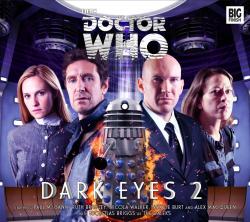
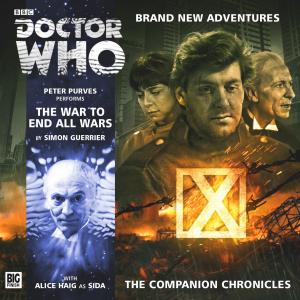 The War To End All Wars
The War To End All Wars 